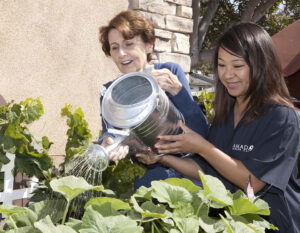Family caregivers can understand why they typically are the preferred providers of their senior loved ones’ long-term care. Not only are they trusted and familiar, but in the best cases they are proven to have the authentic love and concern that caregiving requires. Therefore, it can be difficult for seniors and families to open this close circle of trust to additional help. But when caregiver burnout or financial constraints limit the amount of long-term care a family can provide, sometimes the only option left is to trust someone else with the task.
With the COVID-19 global pandemic is putting some extra stresses on family caregivers, they may want to consider getting some support while sheltering at home to minimize exposure. Caring for a loved one at home already has its challenges, especially when it involves a health condition such as Alzheimer’s or dementia, diabetes, Parkinson’s, hypertension, COPD or CHF. A professional caregiver from an agency like Amada Senior Care can provide standby assistance to ensure a loved one’s safety and supervision and provide respite care to family caregivers who may be starting to experience symptoms of stress.
Quality senior care requires a patient-centered approach. Trust ties together the entire support network of the many human connections surrounding a patient. All participating parties – from seniors to family, doctors, caregivers, facilities, and agencies – are involved in long-term care and depend on each other in some way. When trust is securely in place, this dependence is only functional and healthy
When the following three types of relationships work harmoniously to benefit a senior, you know that trust has been established to create a supporting bond that you or your elderly loved ones can lean on. Along with these examples of trust’s critical role in senior care, here are ways for you to build it:
Trust Between Senior and Caregiver
Can you or your elderly loved one depend on a caregiver to be punctual, reliable and easy to communicate with? Is the caregiver responsible? And does the state of the senior’s health, hygiene, mood, and home reflect this? If questions like these can be answered with a confident “yes,” the caregiver has earned your trust. Both parties need to continue actively building trust in this relationship.
Caregivers must provide personalized services that meet all expectations set by the senior’s needs, by the family or by the agency that employs them. They must also value the very close proximity they have to a senior as a sensitive position. They should show attentive interest in the senior from the very start. According to the Alzheimer’s Association, a person with dementia can actually sense a caregiver’s lack of interest or impatience. Seniors take cues like this to determine the trustworthiness of their caregivers. Seniors and families who see good habits and a positive, genuine mindset in a caregiver will feel reassured in depending on them to supervise their elderly loved one.
Families should slowly integrate caregivers into a senior’s daily life and develop trust in them. Take an appropriate amount of time to interview agencies and caregivers. Once hired, incrementally escalate a caregiver’s amount of responsibilities and the level of intimacy that comes with them. For example, let the caregiver focus on companionship and housekeeping before monitoring hygiene and dressing. Over time and with patience and supervision, you will soon see whether you can trust a caregiver.
Trust Between Caregiver and Supervisor
The relationship between a caregiver and their supervisor is a working dynamic. Behind the curtain of senior care are skilled professionals dedicated to providing the best quality of service for senior loved ones. The caregiver’s supervisor is one of these professionals who is just as concerned about the quality of care as a senior or their family may be. Indeed, their livelihood depends on it.
A good supervisor makes sure the caregivers they hire are qualified with the correct background, training and certification. This may include facilitating background checks, reference checks, phone and in-person interviews and required orientation. Before a caregiver ever sees the senior, they’ll care for, they are vetted or screened to be a good worker and a representative of their agency. Agencies like Amada Senior Care rely on this process to find caregivers who reflect the integrity of their supervisors as well as their entire organization.
“Our caregivers make us who we are. Without the commitment, dedication and love they show our clients, Amada could never have become what it is today.” – Chad Fotheringham, President of Amada Senior Care Franchise
There needs to be mutual trust between a caregiver and their supervisor. A caregiver with a good supervisor will work with dedicated commitment and high quality. Caregivers mistreated by supervisors or clients are given less motivation to do their job well or to care much about it. When a good supervisor provides the guidance, respect and compensation caregivers deserve, they are trusted in return. All of this leads to better care for the seniors who trust them.
Trust Between Families and Service Providers
Just because a service provider, like a living facility or caregiver agency, advertises their business as the right fit, you are the one who will ultimately confirm this. When your selection of a service provider affects everything around the senior receiving care, trust must be earned at its highest value.
Seeing as you will be paying service providers for long-term care, you need to expect them to deliver trustworthy service that meets the bill. You may feel open to trusting a service provider with the long-term care of you or your senior loved one, given that you pay them to do their job. Letting go of this responsibility exposes you or your loved one to unknown dangers that you may not be able to control.
Elder abuse is a real problem in society. Its risk factors include senior isolation, declining physical and mental health, high level of dependence, and caregiver stress. You want a service provider with training and protocols in place, as Amada Senior Care does, to protect seniors against these risk factors and to prevent elder abuse from happening. You can find such an agency by ensuring that trust, as depicted in the above examples, is strongly founded in their organization, operations, and personnel.
Ask as many questions as you can when shopping for a service provider and trust your intuition if it tells you something is wrong. Speak to long-term care advisors about your options, then make your decisions after enough research. Monitor care after you have decided on a provider and take assertive action should you ever need to find another one.
While you are responsible for the final say on a service provider’s trustworthiness, the provider’s job is to perform and operate for the purpose of earning your trust every step of the way. When trust is earned, everybody wins.
Do you need long-term care advice? Speak to a long-term care advisor near you.
“TRUST: Its Critical Role in Senior Care,” by Michelle Flores & Michelle Mendoza, Amada Blog contributors.















